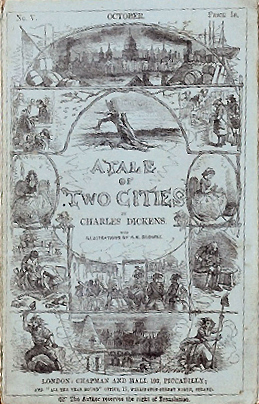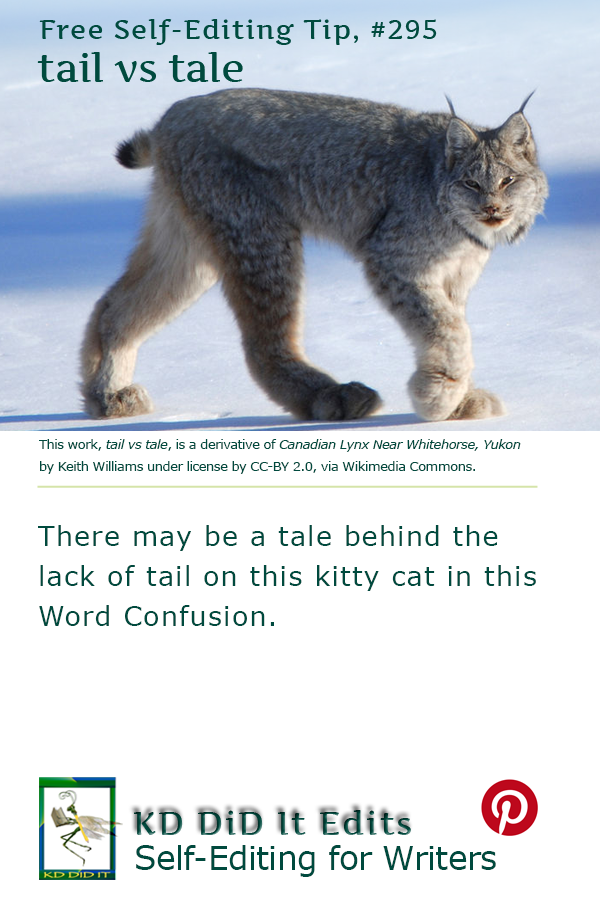Revised as of
3 Jan 2023
I’m not sure how writers who have supposedly read a few tales in their lives could possibly confuse tail with tale. I know a few tails might be swishing and flicking if that tale gets really interesting. And I know my tail gets to twitching when I run across a word confusion, ahem, *grin*.
Word Confusions . . .
. . . started as my way of dealing with a professional frustration with properly spelled words that were out of context in manuscripts I was editing as well as books I was reviewing. It evolved into a sharing of information with y’all. I’m hoping you’ll share with us words that have been a bête noire for you from either end.
If you found this post on “Tail versus Tale” interesting, consider subscribing to KD Did It, if you’d like to track this post for future updates.
| Tail | Tale |
|---|---|

Jungle Book by Alias 0591 from the Netherlands (Jungle book uploaded by russavia) is under the CC-BY-2.0 license, via Wikimedia Commons. — Shake that tail! |

Serial Tales by Chapman & Hall of Christies Auction House is in the public domain, via Wikimedia Commons. — It seemed such an appropriate “tale”. |
| Part of Grammar: | |
| Noun 1, 2; Verb 3, intransitive & transitive Plural for the noun: tails Third person present verb: tails |
Noun
Plural: tales |
| Noun: Hindmost part of an animal, especially when prolonged beyond the rest of the body, such as the flexible extension of the backbone in a vertebrate, the feathers at the hind end of a bird, or a terminal appendage in an insect 1
End of a long train or line of people or vehicles
[Informal] A person secretly following another to observe their movements [Informal] A person’s buttocks [Vulgar slang] A woman’s genitals
[tails] Reverse side of a coin (used when tossing a coin) [Law, chiefly historical] Limitation of ownership, especially of an estate or title limited to a person and their heirs 2 Verb, intransitive: [Of an object in flight] Drift or curve in a particular direction Verb, transitive: [Rare] Provide with a tail [Archaic] Join one thing to another |
Fictitious or true narrative or story, especially one that is imaginatively recounted
[Archaic] A number or total |
| Examples: | |
| Noun: The trailed tail of a capital Q is what distinguishes this letter. The cars were head to tail. The men looked debonair in white tie and tails. Put the armored truck at the tail of the convoy. The forecast says we’re in for the tail of a hurricane. Fireworks followed when the coach kicked Ryan in his tail. My wife thinks going out with you guys will keep me from chasing tail. The land was held in tail general. Verb, intransitive: The next pitch tailed in on me at the last second. Verb, transitive: Her calligraphy was topped by banners of black ink and tailed like the haunches of fabulous beasts. Each new row of houses tailed on its drains to those of its neighbors. |
You lived to tell the tale.
Storytellers tell tales. Paul Bunyan is a tall tale. We’ll need an exact tale of the dead bodies. That’s an old wive’s tale. Ma, Henry’s telling tales again. . . . and thereby hangs a tale. |
| Derivatives: | |
| Adjective: tailless, taillike Adverb: taillessly Noun: tailer, taillessness |
|
| History of the Word: | |
|
Old English talu meaning telling, something told is of Germanic origin and related to the Dutch taal meaning speech and the German Zahl meaning number, also to tell.
Archaic, probably from the Old Norse. |
C’mon, get it out of your system, bitch, whine, moan . . . which words are your pet peeves? Also, please note that I try to be as accurate as I can, but mistakes happen or I miss something. Email me if you find errors, so I can fix them . . . and we’ll all benefit!
Satisfy your curiosity about other Word Confusions on its homepage or more generally explore the index of self-editing posts. You may also want to explore Book Layout & Formatting Ideas, Formatting Tips, Grammar Explanations, Linguistics, Publishing Tips, the Properly Punctuated, Writing Ideas and Resources, and Working Your Website.
Resources for Tail versus Tale
Apple Dictionary.com
Pinterest Photo Credits
Canadian Lynx Near Whitehorse, Yukon by kdee64 (Keith Williams) (Flickr) is under the CC BY 2.0 license, via Wikimedia Commons.


